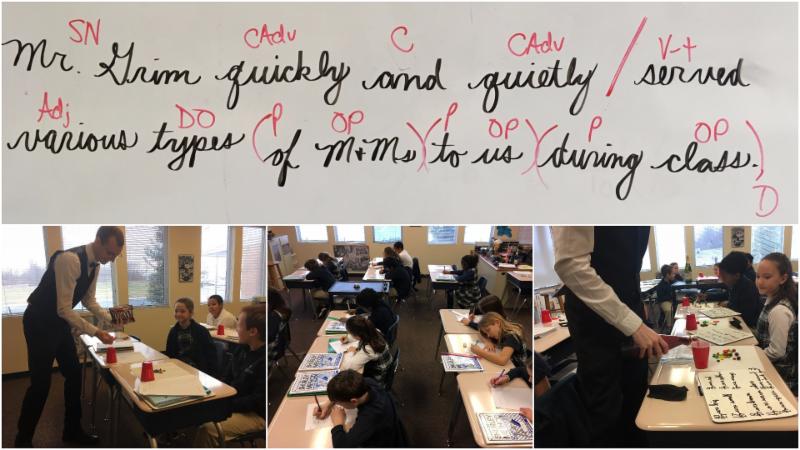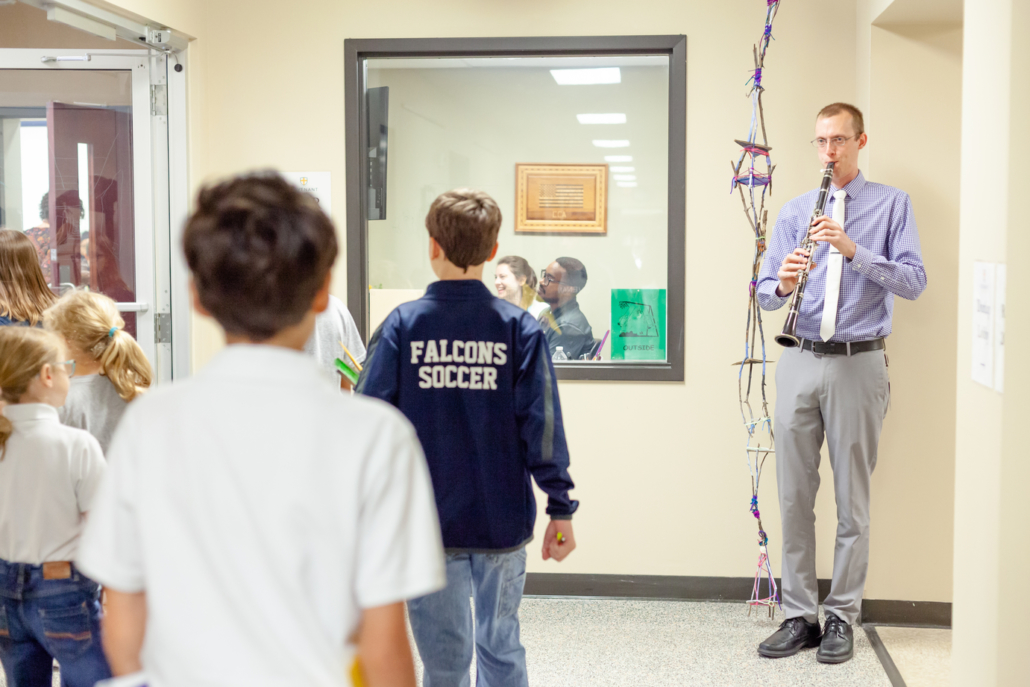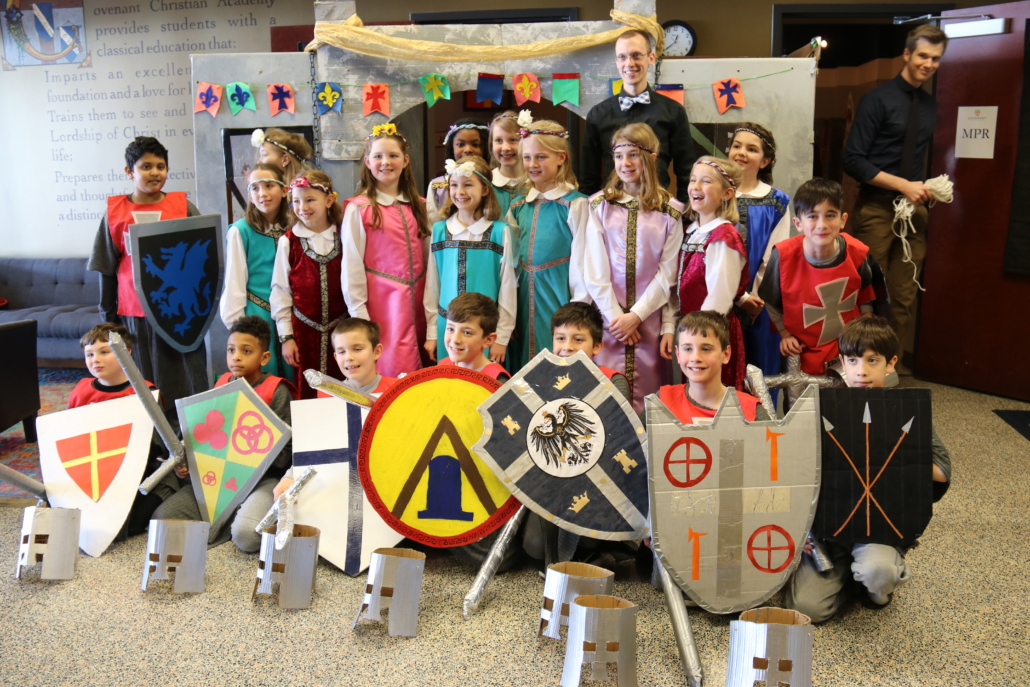Get to know our fourth grade teacher:
Mr. Nate Grim
When did you know that you wanted to be a teacher? How did you end up teaching 4th grade at Covenant?
When I was in intermediate school, I realized I had a knack for learning instruments. My dream was to be like my instrumental music teachers, so I decided to major in music education and performance. Once I graduated college, the recession hit, and music positions were difficult to find. I ended up substitute teaching for local public schools. In fact, my first day of substituting was for a fourth grade class, and I loved it! Over the next three years of substituting, I wound up enjoying the regular elementary classroom more than the general music classroom. I eventually heard of an opening in the Grammar School here at Covenant, so I applied. I was able to enter Covenant because Mrs. Swartz left the classroom to be the full-time Grammar School Dean.
What are some of the things that you enjoy most about teaching 4th graders?
Fourth graders are at a level of maturity that I really enjoy. They’re a lot of fun to talk to because they have nearly a decade of life experiences. I most enjoy when students either ask a question beyond the scope of a lesson or one I don’t know the answer to. It allows both the students and me a moment of shared discovery. Fourth graders are always excited to learn about medieval history, so it’s exciting to be the person who shares with them the stories of Joan of Arc, William the Conqueror, Martin Luther, etc. for the first time.
In the Grammar School years, Covenant students learn a lot through singing and chants. What are some of the topics they learn through chants? What are benefits you’ve seen in this way of learning?
In fourth grade the chants and songs are used every day in a number of different subjects. We travel through the main events of the Middle Ages, Renaissance, and Reformation time periods. Each history lesson is accompanied by a song or chant which contains key events, facts, dates, and names of people. Some popular songs are “Mohammed and Islam”, “The Barbarian Invasions and Vikings”, and “Justinian the Great”. In grammar, concepts such as, parts of speech and verb tenses, each have a song or chant which help students deposit bits of information into their brains for present and future use. The repetition of the songs and chants ensure that students will remember these concepts for both the short and long term. In fact, I know a number of Covenant graduates who have used their Grammar School chants and songs to answer questions on college assessments. In addition, even if a student doesn’t remember every song and chant taught at Covenant, he/she has received a solid foundation in the structure of the English language which creates a pattern for effective writing and communication in the dialectic and rhetoric stages, college, workplace, and community. The same idea applies to history because by the end of the year, the students in fourth grade can sing through the entire span of history we have studied. They are gifted with a chronological order of our world’s narrative.
A classical education seeks to help students love to learn. What are some of the ways that you try to help students love learning at Covenant?
Students love a well-told story and experiencing firsthand what they are learning about. In literature class, we are reading classic repertoire like The Hobbit, which ends in a celebration where students get to dress up as a character and watch the movie. In history we are reading the famous stories and legends of the Middle Ages which come to life with a medieval feast. In writing, we are reading engaging stories and excerpts that allow students to creatively retell the story in their own words. Field trips and hands-on activities also accompany the content we are learning about. We visit the Philadelphia Museum of Art so we can see the arms and armor exhibit. We also create our own dye from natural sources allowing the students to experience what it was like to paint in the Middle Ages. Lastly, Singapore Math lends itself well to forming a love for numbers. The hands-on approach uses manipulatives to enforce the concepts making learning math an enjoyable experience.

You have some fun ‘outside the classroom’ traditions in 4th grade. [e.g., ice cream party to start the year, bonfire at your brother’s farm, sledding down the hill on a winter day]. Tell us about some of those. How do you think these kinds of things impact your classroom?
In addition to the above-mentioned activities, I’ve also organized a camping weekend at Gifford Pinchot State Park. Great memories are made when people spend time together. Some of my best memories as a child come from church camping, youth group, marching band, and community music ensembles. I think it’s important for our parents, students, and teachers to gather together to build community and create memories, too. Over the past few years, I’ve invited my upcoming fourth grade students, parents, and siblings to meet me at an ice cream shop. This provides the opportunity for me to meet parents and students face to face prior to school beginning. It probably makes the first day of school a bit easier for students because we’ve shared an experience together. It also gives incoming students a chance to connect with their new classmates and parents to meet other parents.
You are often seen playing musical instruments around the school. What musical instruments do you play? How do music and singing enhance the student experience at Covenant?
Since I was a music education major in college, I had to be proficient at playing all of the common band and orchestral instruments. It’s difficult to put an exact figure on the number of instruments I play since the clarinet family alone is made up of multiple types, such as soprano, alto, bass, etc. Here is a condensed list of what I often play: clarinet, oboe, English horn, bassoon, saxophone, recorder, and handbells. Each week I and/or an ensemble play various instruments in both the upper and lower hallways. This tradition creates weekly anticipation and much excitement. I love that students can view music through a Biblical lens here at Covenant. They get to see how Scripture, poetry, physics, aesthetics, time, mathematics, and history all come together in the third part of the quadrivium, music. Music and singing point us to the attributes of God and show us the fallen nature of man.
What advice would you give to a student or family who is considering a move to a classical, Christian education at Covenant?
For a family interested in a classical education at Covenant, I recommend reading Dorothy Sayers’s essay, “The Lost Tools of Learning”, and doing research on the classical movement. Sayer’s essay articulates what our current educational system has lost and needs to recover to turn out students who can engage the world around them and critically think and articulate themselves. In addition to your own research, schedule a tour at the school during the academic year so you can see the students in action. Visit all levels of the school (grammar, dialectic, and rhetoric) because the three stages work together to educate our students. Take time to talk with the staff and faculty since most were educated in a public school setting. This allows them to easily communicate the distinct points of classical education.
Interested in a classical, Christian education at Covenant for your child? Come to one of our Group Tours on select Tuesdays at 9:00AM! Please fill out the form below or contact our Admissions Director, Katie Broeg, to RSVP for a Group Tour. If none of these dates work for your family, please contact Katie so we can schedule another time for your visit. 717.540.9885 ext. 232 | Katie.Broeg@DiscoverCovenant.com





